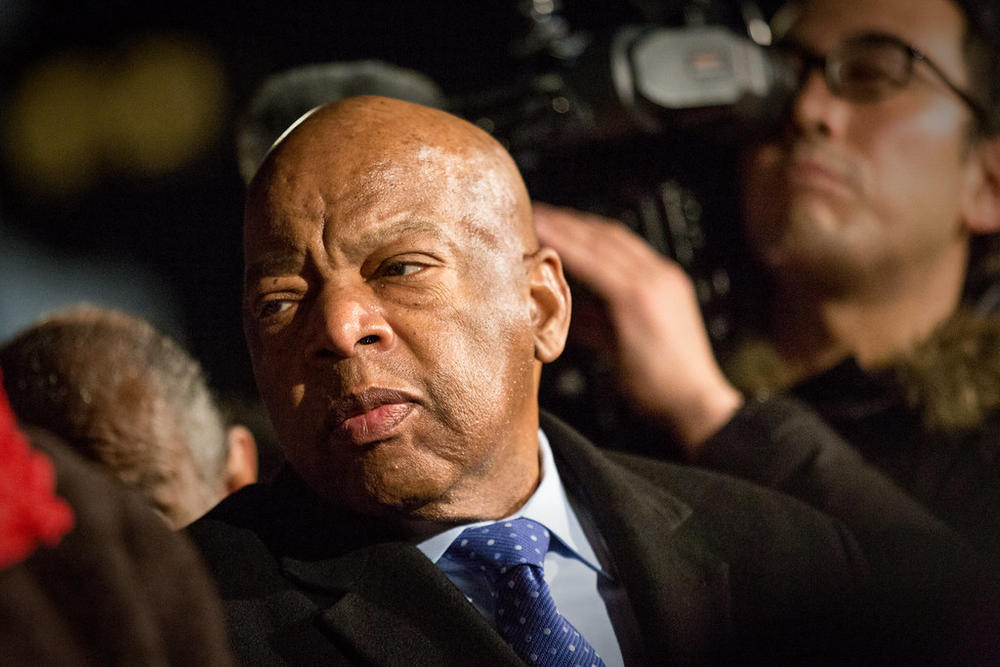
Section Branding
Header Content
Classroom Resources To Honor Rep. John Lewis
Primary Content

John Lewis, one of the most prominent and visible activists in the civil rights movement, passed away on July 17, 2020, at the age of 80. He was one of the original 13 Freedom Riders, Chairman of the Student Nonviolent Coordinating Committee, led over 600 marchers across the Edmund Pettus Bridge in Selma, Alabama, and served as Georgia's 5th District Representative in the United States Congress from 1987 to 2020.
Use these free digital resources to explore the life and legacy of John Lewis.
1. John Lewis | Civil Rights Movement
Grades: 5-12
Raised on a cotton field in rural Alabama, Rep. John Lewis served on the frontline of the Civil Rights Movement to end systematic racial segregation. From speaking at the March on Washington to enduring severe beatings as he participated in the Freedom Rides, John Lewis continued the fight for equality as a U.S. Congressman.
2. The Right to Vote
Grades: 6-12
John Lewis was one of the many who fought long and hard for the passage of the Voting Rights Act of 1965, and as an elected member of Congress, he was a beneficiary of this legislation. Yet hard-won rights are not necessarily secure. In the Shelby County v. Holder ruling of 2013, the Supreme Court struck down key sections of this legislation, and, as Lewis says, “stabbed the Voting Rights to its very heart.”
3. John Lewis' Speech | The March
Grades: 6-12
Watch footage from The March’s official program, including John Lewis’ (of the Student Nonviolent Coordinating Committee) speech. The powerful speech made by the SNCC chairman highlighted the unfair plight of working class Blacks across the nation.
4. Faith in Change: John Lewis | Finding Your Roots
Grades: 9-12
This lesson uses video segments from the PBS series Finding Your Roots to explore the American civil rights movement of the 1960s through the personal experience of one of its most prominent leaders—Congressman John Lewis. Congressman Lewis speaks about his early experience of Jim Crow laws and how that affected his life. At the age of eighteen, he joined Dr. Martin Luther King Jr. in the struggle for civil rights.
5. John Lewis: Get in the Way Educational Guide
Grades: 6-12
This study guide uses hands-on activities to promote critical thinking about themes presented in the film John Lewis: Get in the Way. Students explore the work and legacy of Lewis and the Student Nonviolent Coordinating Committee (SNCC), deepening an understanding of the Civil Rights Movement through a youth-centric, direct-action lens. Drawing connections to modern day struggles, students identify their own potential contributions to social issues that affect and inspire them. Educators are encouraged to use the guide as a whole, in sections, or as a launching pad to support their own facilitating methods and interests.
6. The Nashville Sit-Ins
Grades: 6-12
As a college student, John Lewis learned the philosophy and the strategies of nonviolent direct action from his mentor, Rev. James Lawson. Lawson, Lewis, local ministers and students organized a sit-in campaign in 1960 at downtown Nashville lunch counters to challenge the legally sanctioned custom of denying service to African Americans. The student protesters faced harassment, attacks, arrest and jail and their courage inspired many subsequent desegregation campaigns in Nashville and across the country.
7. Going Back to Atlanta
Grades: 6-12
John Lewis has served as a member of Congress on Capitol Hill for over 30 years, but every weekend he travels back to his home district in Atlanta, Georgia. As Lewis' staff reports, “he’s more fun loving” in Atlanta. As a longtime activist, he is energized by person-to-person contact with those he represents. What is the source of Lewis’ tenacity? “Home is a reservoir,” he explains, “you come back to get a little strength.”
8. Civil Rights Activist John Lewis: Looking Back
Grades: 9-12
Student activist Jonathan Butler and Congressman John Lewis sit down to discuss the Eyes on the Prize series and the Civil Rights Movement in this video from Eyes on the Prize: Then and Now. Lewis reflects on the 1965 Selma to Montgomery protest march.





